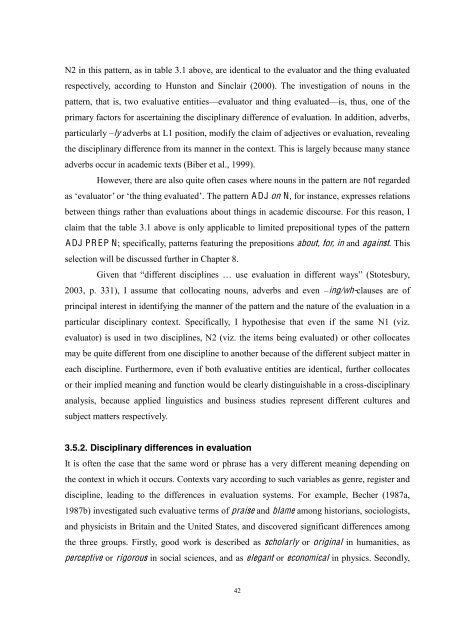Evaluative Meanings and Disciplinary Values - eTheses Repository ...
Evaluative Meanings and Disciplinary Values - eTheses Repository ...
Evaluative Meanings and Disciplinary Values - eTheses Repository ...
You also want an ePaper? Increase the reach of your titles
YUMPU automatically turns print PDFs into web optimized ePapers that Google loves.
N2 in this pattern, as in table 3.1 above, are identical to the evaluator <strong>and</strong> the thing evaluated<br />
respectively, according to Hunston <strong>and</strong> Sinclair (2000). The investigation of nouns in the<br />
pattern, that is, two evaluative entitiesevaluator <strong>and</strong> thing evaluatedis, thus, one of the<br />
primary factors for ascertaining the disciplinary difference of evaluation. In addition, adverbs,<br />
particularly ly adverbs at L1 position, modify the claim of adjectives or evaluation, revealing<br />
the disciplinary difference from its manner in the context. This is largely because many stance<br />
adverbs occur in academic texts (Biber et al., 1999).<br />
However, there are also quite often cases where nouns in the pattern are not regarded<br />
as evaluator or the thing evaluated. The pattern A DJ on N, for instance, expresses relations<br />
between things rather than evaluations about things in academic discourse. For this reason, I<br />
claim that the table 3.1 above is only applicable to limited prepositional types of the pattern<br />
A DJ PR EP N; specifically, patterns featuring the prepositions about, for, in <strong>and</strong> against. This<br />
selection will be discussed further in Chapter 8.<br />
different disciplines use evaluation in different ways (Stotesbury,<br />
2003, p. 331), I assume that collocating nouns, adverbs <strong>and</strong> even ing/wh-clauses are of<br />
principal interest in identifying the manner of the pattern <strong>and</strong> the nature of the evaluation in a<br />
particular disciplinary context. Specifically, I hypothesise that even if the same N1 (viz.<br />
evaluator) is used in two disciplines, N2 (viz. the items being evaluated) or other collocates<br />
may be quite different from one discipline to another because of the different subject matter in<br />
each discipline. Furthermore, even if both evaluative entities are identical, further collocates<br />
or their implied meaning <strong>and</strong> function would be clearly distinguishable in a cross-disciplinary<br />
analysis, because applied linguistics <strong>and</strong> business studies represent different cultures <strong>and</strong><br />
subject matters respectively.<br />
3.5.2. <strong>Disciplinary</strong> differences in evaluation<br />
It is often the case that the same word or phrase has a very different meaning depending on<br />
the context in which it occurs. Contexts vary according to such variables as genre, register <strong>and</strong><br />
discipline, leading to the differences in evaluation systems. For example, Becher (1987a,<br />
1987b) investigated such evaluative terms of praise <strong>and</strong> blame among historians, sociologists,<br />
<strong>and</strong> physicists in Britain <strong>and</strong> the United States, <strong>and</strong> discovered significant differences among<br />
the three groups. Firstly, good work is described as scholarly or original in humanities, as<br />
perceptive or rigorous in social sciences, <strong>and</strong> as elegant or economical in physics. Secondly,<br />
42
















